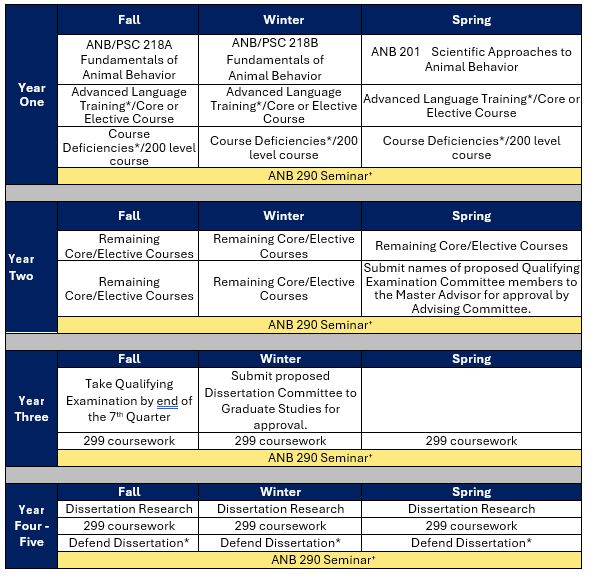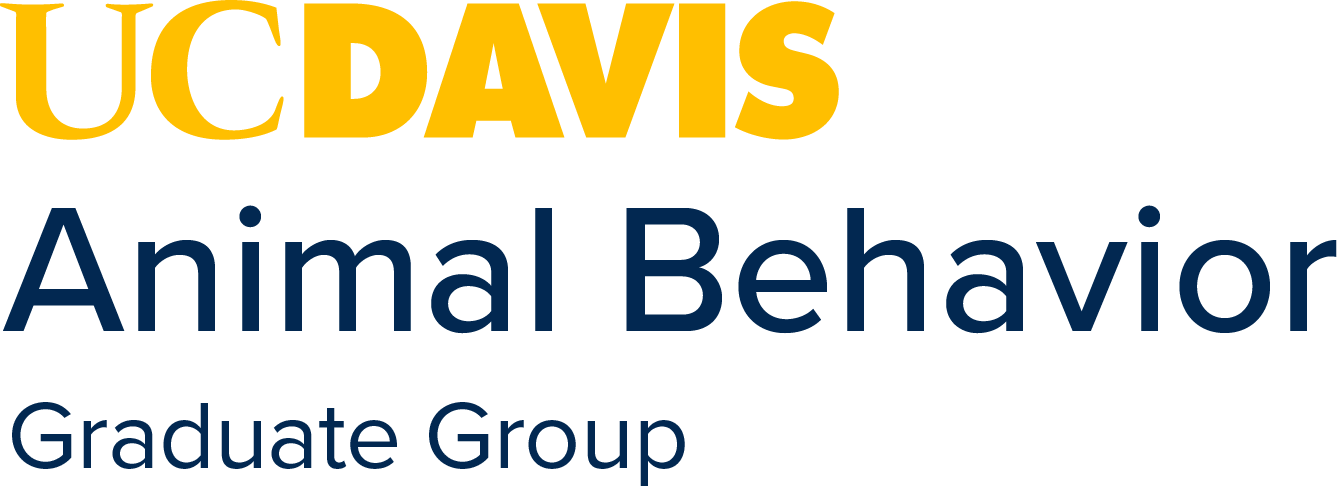Ph.D. Program
Students applying to the Animal Behavior Graduate Group may only apply for admission to our Ph.D. program. The program does not admit students directly to the M.S. program.
Prior to joining the program, applicants must illustrate a breadth of knowledge in areas below to meet pre-requisite requirements:
Pre-Requisite Course Requirements
- Ecology (equivalent of Ecology and Evolution 101; Environmental Science and Policy 100)
- Genetics (equivalent to Biological Sciences 101)
- Statistics (equivalent to Psychology 103; Statistics 102
- Evolution (equivalent to Evolution and Ecology 100)
- Animal Behavior (equivalent to Neurobiology, Physiology, and Behavior 102)
- Physiology (equivalent to Neurobiology, Physiology, and Behavior 101)
It is common for students to be admitted to the program with a deficiency in one or two of the above areas. If a subject area is incomplete, the student's Academic Guidance Committee will work with the student to determine deficiencies and coursework that can be taken to complete this requirement within their first year of the program.
Course Requirements
Doctoral students are required to complete 26 units of coursework. At least 16 of the 26 units completed for the degree must be taken in graded courses offered at the 200 course level. (Courses in the 300 and 400 series may be accepted if they have been approved for graduate credit.) Graduate students must register for a minimum of 12 units per quarter to maintain full-time status. The 26 units of coursework will be completed through a combination of core courses, seminar courses, elective coursework, and dissertation electives.
- Core Courses (ANB 218A/B, AND 201; usually taken within the first year of the program)
- Advanced Statistical Analysis (multiple course options are available depending on the students academic background and research needs)
- Seminar Course (ANB 290; a one unit course offered Fall, Winter, and Spring)
- Elective Courses (Two elective courses 3-units each in the student's area of interest. For students interested in teaching, one course from the FUSE Graduate Academic Certificate program can count towards this requirement)
Dissertation Plan
ABGG follows Dissertation Plan C, which calls for a three member (minimum) dissertation committee and a final oral examination. The final oral examination will ordinarily include a public presentation of the dissertation, followed by an oral defense of the dissertation to the Dissertation Committee.
Committees
From admission to graduation, the Animal Behavior Graduate Group is committed to ensuring our students have the support systems needed to excel within graduate school and the larger science community. The committee's listed below all take on a major role in this complex net of support.
- Admissions Committee
- The Admissions Committee is composed of three to four ANB faculty members (volunteers appointed by the Chair of ABGG) and one graduate student (elected by the ABGG graduate students). Shortly after the deadline for applications, files are reviewed and ranked by the Admissions Committee. Based on academic accomplishment and potential, this committee determines which of the applicants can be recommended for admission to the Dean of Graduate Studies. Simultaneously, faculty members examine the files to identify students whom they are willing to sponsor. No student can be admitted to the group unless at least one faculty member in good standing indicates that they are willing to act as that student's major professor.
- Course Guidance Committee/Graduate Advising Committee
- Students should establish their Course Guidance Committee shortly after entering the program. This committee is composed of a faculty advisor and a student advisor, who are assigned to the student by the ANB Graduate Advising Committee, and the student’s major professor. A third faculty member may also be added to the committee, at the discretion of the student and the major professor. The Course Guidance Committee is responsible for helping students develop their study plan, and must approve any coursework taken to fulfill the admissions requirements as well as the electives taken to fulfill the course degree requirements.
- Qualifying Examination Committee
Four faculty members, at least three of whom must be ANB faculty members, serve on the Qualifying Examination committee. The student selects faculty who are interested in the same type of research, who are knowledgeable in specific areas of interest, and with whom they have had interactions. The student’s major professor cannot serve on the Qualifying Examination committee.
The student should email the following to the Graduate Advising Committee for review and approval: (1) a list of the proposed QE members, along with the topic area(s) each will address, and (2) a summary of the proposed dissertation research (no more than 1 page). Once approved, students should contact prospective committee members early (e.g. at least 4 months prior to the target examination date), and determine which faculty member will serve as chair. Once an approximate date for the exam has been determined, students should complete and submit the Qualifying Exam Application.
See the UC Davis Graduate Council Policy for Doctoral Qualifying Examinations (https://ucdavis.app.box.com/v/GC2005-02-QE) for more details about the Qualifying Examinations.
Once approved, changes to the Committee must be approved by the Office of Graduate Studies (OGS). Experts in your field of study not directly affiliated with UCD and/or members who must participate remotely may also be considered. Visit the GradSphere for the Reconstitution of Committee Membership Request and External Committee Membership Application. .
- Dissertation Committee
After passing the Qualifying Examination students must suggest members to serve on their Dissertation Committee. This committee consists of at least three individuals, one of whom is the student’s major professor. Membership nominations must be submitted to Graduate Studies for formal approval (see UC Davis Graduate Council Policy for Service on Advanced Degree Committees for more details concerning allowable dissertation committee membership).
The dissertation committee consists of at least three members who guide the candidate in his or her dissertation research. The committee arranges for meetings with the candidate as deemed necessary to complete the dissertation. The committee conducts a final oral examination which focuses primarily on questions arising out of the relationship of the dissertation to the general field of study of the dissertation. When the Dissertation Committee determines that the dissertation is acceptable for examination, students must complete the final oral examination which will ordinarily include a public presentation of the dissertation, followed by an oral defense of the dissertation to the Dissertation Committee.
Once approved, changes to the Committee must be approved by the Office of Graduate Studies (OGS). Experts in your field of study not directly affiliated with UCD and/or members who must participate remotely may also be considered. Visit the GradSphere for the Reconstitution of Committee Membership Request and the External Committee Membership Application.
Qualifying Examination
The Qualifying Examination (QE) is a two component examination that is typically taken in the 6th or 7th quarter of a student's graduate program (once they have completed all other coursework requirements). The purpose of this exam is to evaluate each student's breadth and depth of knowledge within the field of animal behavior. The qualifying examination is broken up into two main parts:
- The Written Research Proposal
- The Written Research Proposal (the written component of the Qualifying Exam) should ordinarily follow the style of a 15 page (single-spaced) NSF (or comparable) research proposal. It should outline in detail a proposed dissertation project. After a one-page summary, the proposal should ordinarily include the following components: 1) a 4 summary of the objectives and significance of the proposed research; 2) a conceptually coherent, well organized review of important relevant literature; 3) a summary of key aspects of the proposed study system (e.g., the basic ecology of focal species); 4) a description of preliminary research, if any; 5) a detailed description of proposed research including, as appropriate, experimental designs, methods and statistical analyses; and 6) a brief statement on the broader scientific significance and relevance of the objectives, and on future directions. Students should also include an extensive Literature Cited section in addition to the 15 pages of the main body of the proposal.
- The Oral Examination
- The Oral Component of the Qualifying Examination is approximately 2-3 hours in length that focuses on the student’s proposed research, mastery of the student’s area of specialization, statistical analysis, and research methods. Passing the QE exam makes the student eligible for advancement to Ph.D. Candidacy.
Students should meet with each of their committee members several times prior to the examination to discuss the research proposal and appropriate readings and potential question areas. Students are expected to provide each committee member with a written copy of the research proposal at least three weeks in advance of the examination. If students so choose, they may give a 15-minute informal presentation of their proposal at the beginning of their exam.
Click Here for more information about Doctoral Qualifying Examinations
Advancement to Candidacy
Students are eligible to advance to candidacy after their successful completion of all Animal Behavior graduate program degree requirements, and after passing the Qualifying Examination. Students must have maintained a minimum GPA of 3.0 in all course work undertaken (except those courses graded S or U), and must have passed both quarters of Fundamentals of Animal Behavior (ANB/PSC 218A/B) with a grade of B or higher before a committee is appointed to administer that examination. The student must file the appropriate paperwork with the Office of Graduate Studies and pay the candidacy fee in order to be officially promoted to Ph.D. Candidacy.
Time-to-Degree
The typical time-to-degree for an ABGG doctoral student is 5.5 to 6 years. The chart below illustrates the academic and milestone progression of our graduate students:

